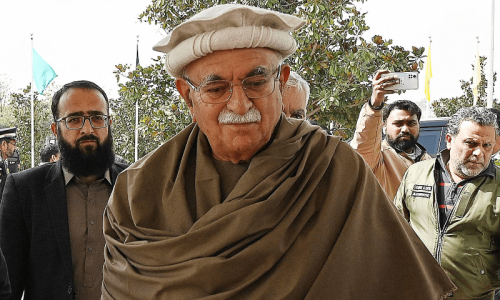WASHINGTON, June 27: US lawmakers demanded direct access to Dr A.Q. Khan on Wednesday, arguing that the network of nuclear proliferators he allegedly set up was still active and could not be shut down completely without his cooperation.
One lawmaker also demanded international inspection of Pakistan’s nuclear facilities.
“We demand direct access to A.Q. Khan… one of the greatest threats to US security,” said Gary Ackerman, chairman of the House Subcommittee on the Middle East and South Asia.
Several other congressmen also supported the demand at a joint hearing on Capitol Hill on “The Khan network, nuclear proliferation and Pakistan.”
Mr Ackerman, who chaired the joint hearing with Congressman Brad Sherman, regretted that instead of punishing the country for its alleged involvement with the Khan network, the Bush administration “awarded Pakistan with a squadron of F-16s”.
Congressman Sherman, however, reminded the panel that Pakistan was unlikely to accept this demand and instead urged Islamabad to “tell the whole story” behind Dr Khan so that his network could be dismantled.
Mr Ackerman, a Democrat, indicated that Islamabad was also involved in the activities of the Khan network because it received “missiles from North Korea in return” for what Dr Khan gave the North Koreans.
He claimed that so far only a handful of Dr Khan’s co-conspirators had been arrested and urged Pakistan to cooperate with the international community in catching others.
He criticised the Bush administration for accepting Pakistan’s assurance that the network had been closed. “Whatever fiction the administration may want to believe … the network may still be doing business under new management,” he said.
Congressman Sherman, also a Democrat, noted that Dr Khan was in-charge of a programme financed by the Pakistani government and advised the Bush administration to ensure that the F-16s supplied to Pakistan should not have the technology to deliver nuclear warheads.
“Whatever technology we put on those F-16s, the Chinese will be looking at it very closely,” he warned, alluding to close defence ties between China and Pakistan.
Mr Sherman, however, advised his fellow lawmakers to put pressure on Pakistan to do only what they can.
“They cannot deliver Dr Khan to American custody. They may not even allow Americans to interrogate him, but they have to tell us the whole story.”
He said that “there will be no riots” in the streets of Pakistan if it divulged the names of Western entities involved with the network and “if we start enforcing Western law on Western companies”.Mr Sherman said that Dr Khan was able to smuggle a large quantity of sensitive items, exploiting the holes that exist in the current export control system and urged the Bush administration to work with other governments to close these holes.
He recalled that there were laws in the United States that prevented US assistance to a country that proliferated and made nuclear weapons outside international control. “It will be interesting to see how these laws will be applied to Pakistan,” he added.
Congressman David Scott, another Democrat, claimed that the Khan network was “a front for the Pakistan government’s acquisition of illicit materials” and demanded greater international oversight of Pakistan’s nuclear programme.
“Without international inspection of Pakistan’s nuclear facilities, we may never know the true extent of Dr Khan’s activities,” he said.
Mr Scott said that Dr Khan has been “so successful” that because of him nuclear technology has now “almost become public domain and is available to anyone who has money”.
Mike Pence, a Republican, urged the lawmakers to deal with this issue ‘very carefully’ because Pakistan is a crucial ally in the war on terror.
He noted that the prospect of Islamists overthrowing the current regime in Pakistan was relatively low. “I have a few quarrels with the regime but this is reassuring to know,” he added.
Congressman Pence also noted that Dr Khan had rebuffed several attempts by Osama bin Laden to acquire nuclear technology and “this might come as a relief” to the US.
He said America’s relations with Pakistan were complex and important, but the administration should not allow Pakistani scientists to share nuclear technology with others.
Congressman Donald Manzullo, also a Republican, regretted that Pakistan had no global export control policies.
Congressman Joseph Crowley, a Democrat, noted that Pakistan, when put to the test, chose the right side. “But we also need to keep in mind that they sided with the Taliban prior to our demanding that they pick a side.”
Mr Crowley also expressed concerns about the stability of Pakistan as a country, saying that the US should also be watching “what happens to nuclear weapons, if something goes wrong with that country.”













































Dear visitor, the comments section is undergoing an overhaul and will return soon.